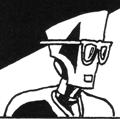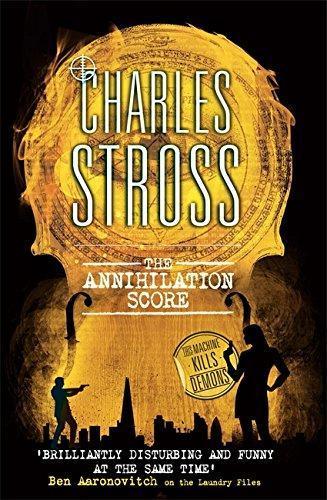dare reviewed The Annihilation Score by Charles Stross (Laundry Files, #6)
Review of 'The annihilation score' on 'Goodreads'
3 stars
The Laundry Files novel I like the least, along with Jennifer Morgue. Even though I still love the series, this book just didn't work for me. This is not really a review as such, it's more of an attempt for me to clarify myself why I feel LF#6 doesn't quite work for me.
The reframing of Bob and Mo's marriage is one thing. Thus far we've had one viewpoint into their relationship, and I thought that they both respect each other. However, Mo's narration makes it clear that she does not respect Bob, at least not at this point in time. And since, as Mr. Stross keeps pointing out, Bob is an unreliable narrator, maybe he doesn't really respect Mo either. Maybe their marriage isn't really working at all and Bob is just lying to himself and the reader. Hell, maybe Bob actually slept with Mhari in LF#5, even though he denies it. Mo doesn't know, we, the readers don't know and cannot know, and even though this isn't a problem as such, the net effect is that the marriage has become for me less interesting to read about. Even though the problems here feel real, they're not the kind of problems that interest me that much.
Mo, as a narrator isn't quite working for me either. As a character she's compelling and interesting (she's not a nice person, but I have no problem with that), it's just that her voice and manner of communication resembles Bob way too much with geek idioms and a tendency to go off on tangents. At times it sounds more like Bob trying to sound like Mo, which turns this into a crazy spiral of meta. And it's not like these things wouldn't have been easy to spot for a professional editor who's been working on the series.
However, by far the biggest problem is the superhero conceit itself. It just doesn't properly mesh into the world of the Laundry Files - it reads more like what-if fan fiction than an actual part of the world. Before this the worldbuilding in LF has been detailed and the results of even smallest things have been explored in-depth, but in this case everything feels a bit superficial, genre-y. The only thing that has the rigorous attention to detail I've come to expect from Mr. Stross is the mid-level societal reaction to superheroes; the street level reaction and the actual reaction of policy makers are glossed over. Unlike in LF#5 where we really got to see what being a vampire does to your head (and in LF#7), in here we don't get a similar insight into being a costumed hero in the Laundryverse. They're here, this is your world now, hurrah. As someone who reads Mr. Stross mostly because he's really into exploring detailed results of interesting scenarios, I didn't really find much of it here. Also, the world doesn't really feel that much changed by anything that happens in this novel. Again, this may be a sort of meta-commentary on the implausibility of superhero fiction, but more than that it just feels lazy.
Despite all this moaning, I gave the book three stars because there's a lot of good stuff here too: the bureaucracy is spot on, the violin is creepy and the actual plot isn't half bad. It's just not the level of good I've come to expect.

